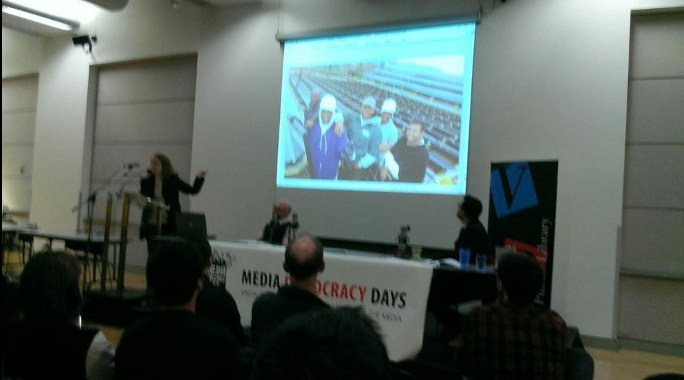I cannot remember the last time I watched or listened to a mainstream news outlet and actually felt more informed, more engaged and more like an empowered member of a mass citizenry, instead of feeling cheated, disillusioned and enraged at whose voices were repeated over and over again.
Probably because that has never happened.
Last Friday, Nov 7, kicked off Media Democracy Days (MDD). Founded in 2001, this annual event (now expanded into a weekend) celebrates independent and democratic media in Canada.
This year’s weekend of democratic festivity — presented by the School of Communications at SFU, Openmedia.ca and the Vancouver Public Library — featured a keynote address by Michael Geist, a screening of the film “Pre-empting Dissent,” and countless other speakers and workshops focusing on media and tools for engagement.
The increasingly expansive number of progressive media events, such as MDD, indicate a shift in the democratic discourse in Canadian media and a growing hunger that Canadians feel for real stories about real communities.
“[MDD is] an incubator or platform for many people to move on within the activist world,” said Gil Aguilar, the Coordinator of MDD, expressing how the community of MDD has acted.
In this way, alternative media is not insular from the larger social movements that fight for more just and healthy communities.
Unfortunately, independent media and the social movements continue to face the same grave challenges in terms of unequal access to the resources, financial stability and tools to rival mainstream conglomerates.
Reilly Yeo, Co-founder of Groundswell and community engagement specialist at OpenMedia.ca, spoke about these barriers and how they are not unique to independent media — they affect all levels of a capitalist society, and marginalize the communities and voices that threaten its agenda.
Ultimately, though, Yeo mentioned how media can be seen as central to the web of power and corporate control in our lives.
Additionally, as was brought up at the MDD workshop on Saturday — “Sharing Practices and Digital Tools for Social Change” featuring Marcos Gomez (ACORN BC), Meghan Sali (OpenMedia), Stefan Avijas (Leadnow) and Tara Mahoney (GenWhy Media) — there is a digital divide in the access to technological tools and information sharing, which disproportionately affects low-income communities.
Without the digital tools for media sharing, and without the appropriate financial means to connect with these skills, many individuals are left disconnected from the fight for media democracy. The same goes for small independent media bodies, which don’t have the financial means or skill-sets to compete with larger entities.
Nevertheless, organizers at OpenMedia.ca and similar organizations have been fighting for a free and open Internet and net neutrality for years.
Although the power of large international trade agreements, such as the Trans Pacific Partnership, is not subsiding as fast as we would like, the very shift in the way media is relayed, via social media and the culture of smart phones, has increasingly democratized whose stories are told. It has also created the potential for safe spaces in an area of culture not traditionally safe for many groups.
And so herein lies the true power of independent and Do it Yourself media and a democratic framework for the stories that are told. True democratic media is not only accountable to the frontline communities that it supposedly represents, but it is actually composed of those communities.
In this model, the Unist’ot’en Camp, in northern B.C., is able to actually report on what is happening to them and the constant oil and gas developers they are able to fend off with their blockade camp.
Who else is more equipped to report on this struggle than those most engaged in it?
Despite the fact that, like all progressive institutions, independent media is not perfect in its policies of representation, it strives for a more just and accountable outcome. Yeo spoke about the politics of representation and how it “often reflects the problems of broader institutions and how people are racialized, categorized…”
This can be reflected in the racialization and oppression that sprang up from an already existing racial tension, following the Ottawa Shooting, and the misogyny and unsafe space in mainstream media for female victims of male violence that occurred after Jian Ghomeshi’s abuse allegations.
Democratic and independent media strives to take an intersectional approach that looks at the way communities most affected by issues are continually silenced and denied a platform in mainstream media. Though it’s a continual learning process, it is one steeped in being aware of who is speaking, who is taking up space, who is being interviewed and — most importantly — who is taking the time to simply listen.
MDD is providing a great meeting ground in which the various intersecting social movements can assemble.
In terms of a take-home message from MDD, Aguilar suggests we should “try to offer free space, and don’t set a clear agenda; instead, let issues reverberate in the community and allow an open space for dialogue and debate.”
The quest for media democracy and a model of news that best represents the communities who are engaged in trying to change the various systems which are intertwined in keeping them down, starts with us recognizing the true potential of mass movements working collectively.
Together we will have the numbers on our side.
Tania Ehret is a contributing editor for rabble.
Photo: Alex Tse



